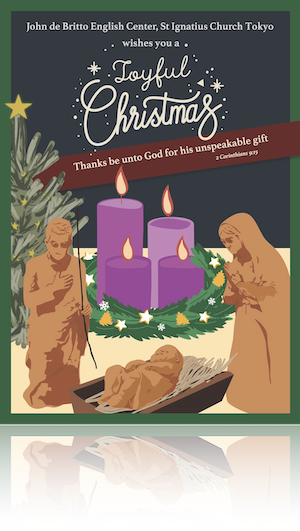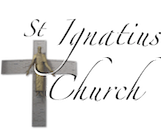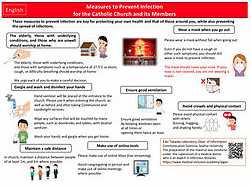
Christmas, The Birthday Of Christ
I have noticed that newspapers and magazines carry articles and advertisements for Christmas shopping all through December. You find suggestions for Christmas presents, Christmas shows, Christmas dinners, and Christmas cakes—but no suggestions for attending even one church service. Very few people seem to reflect on the fact that Christmas has something to do with the birth of Christ. In shopping malls, on radio and TV we hear Jingle Bells, White Christmas, and Rudolph the red-nosed reindeer. And the main Christmas character is Santa Claus! Such is the TikTok-viral Christmas of the media today. What has happened to the Christ of Christmas? Here tonight let’s put Christ back into Christmas. How can we do this? Well, by reminding ourselves of what Christmas really is: the birthday of Christ.

One of the most precious memories I have of a brief trip I made to the Holy Land more than 40 years ago is what I felt on visiting the large basilica at Nazareth and saw the words engraved on the front of the altar: Verbum caro HIC factum est (The Word became man HERE). The basilica at Nazareth is a large ferroconcrete structure erected over the site of what is supposed to have been the house of Jesus’ mother Mary. One may well doubt whether that was the actual spot of her house, but Mary lived somewhere in the town that is known as Jesus’ hometown so it is true that somewhere in Nazareth, according to the gospel of Luke, or maybe even somewhere in Bethlehem according to Matthew—somewhere that can be called HERE—Jesus came into this world.
Our celebration of Christmas reminds us of this event. There was a long period of preparation before Jesus was born in Bethlehem. Why Bethlehem? Well, why not? And why at that particular time? Again, why not? It had to be SOMEWHERE and SOMETIME. And yet the preparations were not really complete. They would never have been complete at any time and place, but a beginning had to be made, even though the world was not ready. That is the meaning of the words in today’s gospel: there was no room at the inn. People in general had no idea of what was about to happen. It was such a great event that it became the starting point for how we count our years. It is now more than 2,000 years since that great event. And we are told that the only people who knew about it at the time were some shepherds living on the margins of society. One speaker I heard pointed out that if Christ were to be born in any of our big cities today, it might be in a dark corner of some public park surrounded by the cold and lonely cardboard huts of homeless people living on the margins of society.
With other birthdays we look back and count the number of years that have gone by. But we don’t have to count the number of years since the first Christmas, because the celebration of the birth of Christ is not a nostalgic trip back 2,000 or more years. It is the celebration of God-with-us NOW. That is the whole meaning of Christmas: the message that God is HERE AMONG US NOW AND ALWAYS—against the world’s claim that God is absent, that God is far away, that God is not needed.
Christmas comes at a good time of year
- —when it’s dark and we want light
- —when it’s cold and we want warmth
- —when the dying year heals old wounds
- —and the coming year invites us to hope for something better.
Jesus came into our darkness to bring us light. He came not to take away the suffering of the world but to share our suffering. That’s how he lives with us and is close to us. He himself was innocent but suffered the death of a condemned criminal. By refusing to curse his executioners or hate the people who brought him to be condemned, he undid the power of sin. Sin is whatever separates us from one another and from God. Jesus undid the power of sin by holding God and humanity together. He forgave his executioners, saying “Father, forgive them,” while committing himself and all of us into God’s hands: “Father, into your hands I surrender myself.”
When he was born into the world, he was a speechless, helpless infant. He had to learn to say “Father” and eventually taught us to say it with the realization that God is our Father and we are all brothers and sisters. He came because he wanted to live with us and be close to us, so that we would be close to one another. Are we ready to open the door to the one who knocks, or is there no room in the inn? Who is the person knocking at the door? Is it the hungry person, and do we offer something to eat? Is it the lonely or the outcast, and do we offer comfort and encouragement? Is it the sick and do we visit them? Is it that person we don’t want to forgive? Is it that person we want to insult or defeat in some way? Do we abhor the wars in the world today and wish for peace while fighting little wars with the people around us?
So let’s recapture Christmas from the media by remembering whose birthday it really is. I don’t know who started making a fortune by selling cakes for Christmas. But Christmas is basically a birthday and birthdays call for cakes. We can consider the cake we eat as a piece of Jesus’ birthday cake. We exchange presents at Christmas, but let’s remember that, in giving “presents” to one another, we want to make ourselves “present” with generous and loving concern. And let’s add that the great model for presents is the gift that God give us in Jesus, whom we invite here today to replace Santa Claus and put Christmas back on track.
Let’s all join together to give thanks for the blessings of the past year and to hope for a brighter year ahead.
CHRISTMAS EVE 2023 St Ignatius Church
Robert Chiesa, SJ
 ENGLISH
ENGLISH  ESPAÑOL
ESPAÑOL 







